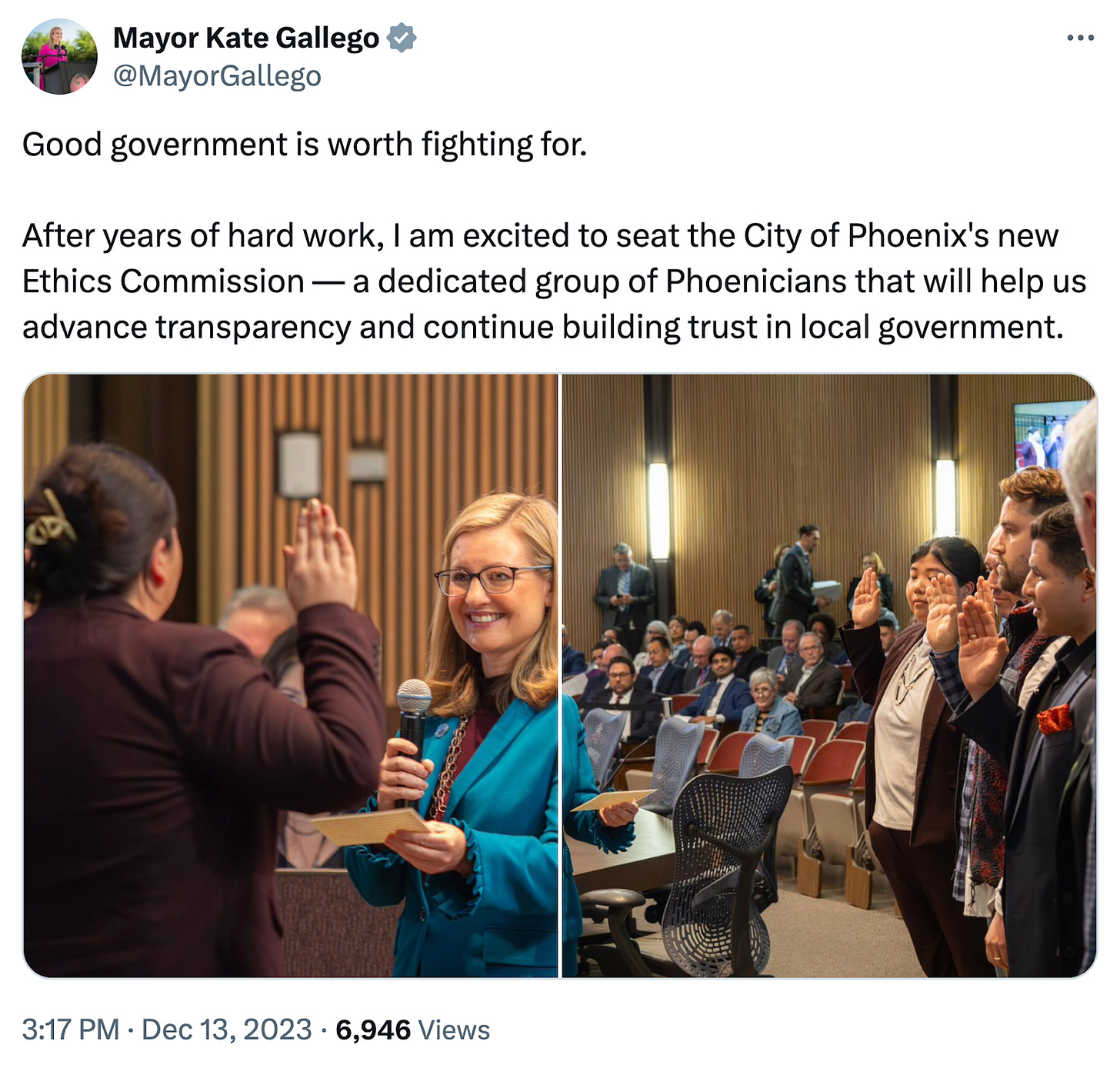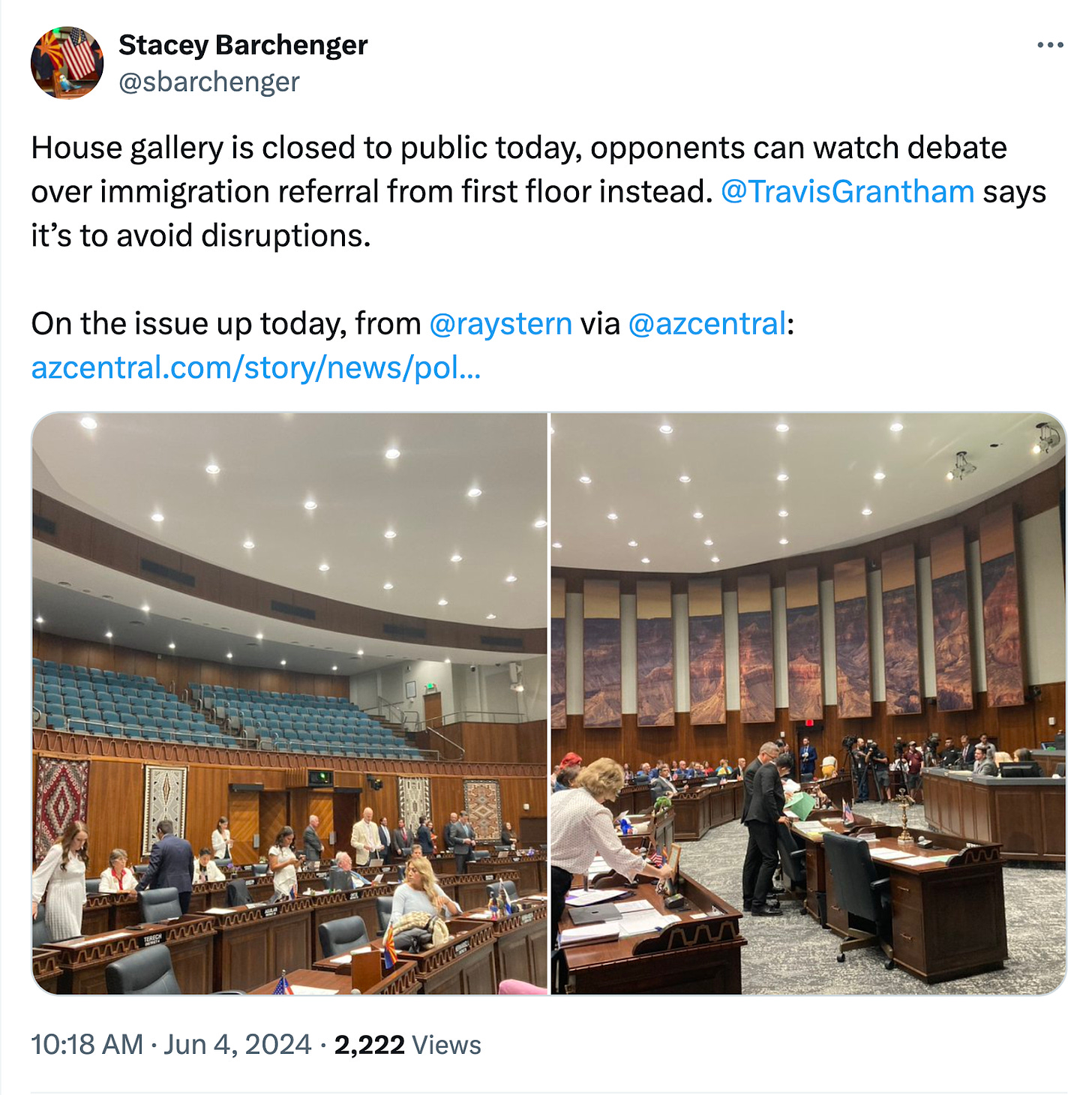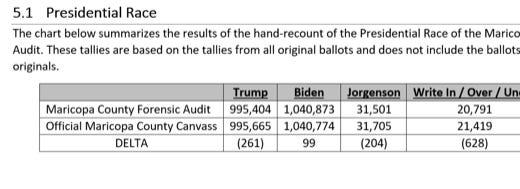
An ethical dilemma
Examining the ethics of Phoenix’s Ethics Commission … From 1864 to 2010 … And are all vegans nudists?
In 2017 the City of Phoenix established its first Ethics Commission and promised independent investigations of impropriety.
Six years later, when the city finally started appointing people to serve on the languishing commission, Phoenix Mayor Kate Gallego framed it as a triumph of transparency.
“Our constituents elected us to serve them, and the Ethics Commission is an important accountability tool that will make our city more transparent to its citizens,” Gallego said in a press release in 2023.
Instead, the city is barring citizens from knowing what the new commission is investigating.
Under the new commission, ongoing misconduct claims against elected officials and city employees will remain under lock until the commission has finished investigating them.

But when Jeremy Thacker, who founded the urban planning group Strong Towns Phoenix, requested access to the ethics complaints the city received, the city initially denied him, even though he submitted several of them himself. Longtime readers will remember Thacker, the disc-golf-loving public records requestor who previously fought with the city to find out how much water its golf courses use.
Thacker’s something of a public records crusader, even if Phoenix is a formidable opponent.
He’s also a watchdog who filed a conflict of interest-based ethics complaint against a property owner in 2022.
But there was no formal place for that complaint to go, and no set standards for it to be investigated. All the complaints the city received seemed to have sat in a black box until the City Council agreed to appoint members to the commission in December last year.
Of the country’s top 10 most populated cities, Phoenix was the only one without a functioning Ethics Commission, Cronkite News reported. The city has a sprawling ethics handbook its elected officials must follow, but until recently, it had no way to enforce those rules.
After the City Attorney’s Office concluded Thacker’s ethics complaint had no merit, Thacker filed a records request for all the ethics complaints the had city received, including his own.
The City Manager’s Office told him the complaints are “confidential,” per emails Thacker sent us.
He kept badgering the city for the records, and they ended up sending Thacker eight complaints filed before December 13, 2023 — the date the Ethics Commission finally got its members.
However, all complaints submitted after that date “will not be disclosed to the public until such times as they have been fully evaluated, investigated or dismissed by the Commission.”
So while the city has hailed the establishment of a formal committee to investigate ethics complaints as a move toward transparency, the public can no longer see what ethics complaints are being investigated.
Phoenix justified the secrecy by pointing to Carlson v. Pima County, a 1984 court case that limited the public’s inspection of records if it could lead to “substantial and irreparable private or public harm.”
Under the arbitrary date of the complaints’ disclosures, that city-imposed standard of harm would go away after the Ethics Commission investigates a claim.
Releasing the complaints before the commission decides their outcome could have a “chilling effect by deterring or discouraging individuals from filing an ethics complaint,” the city told Thacker in an email.
But history has proven shining light on complaints can actually bring more evidence to them. Arizona’s police officers and constables are often reprimanded after repeated violations are reported to their respective oversight committees.
When we asked how this decision was made, and why it was made, Deputy Communications Director Ashley Patton told us it’s simply in the Ethics Commission’s “Rules of Procedure,” and that the records are “available after the Ethics Commission votes.”
If the complaints are confidential, the Ethics Commission will discuss them behind closed doors in executive sessions, leaving little insight into how they make decisions on each case.
That leaves the public out of the process altogether. If residents don’t know what’s going on, they can’t provide input into what their government is doing.
“They give us the illusion of participation, protection with things like the public records law and open meetings law, ethics commissions. Yet none of it really can be enforced or followed. I just find it super frustrating,” Thacker said.
Time is a loop and 2024 is 2010: Arizonans will vote on whether to make it a state crime to be in the country illegally in November’s election after Republican lawmakers approved HCR2060 yesterday. In anticipation of protests, lawmakers shut down the House gallery to onlookers and limited access of typically public spaces to only credentialed employees and escorted guests. Civil rights groups call it the second coming of SB1070, saying it will endanger immigrants and Latino citizens. Business groups warn it will hurt the state’s reputation and economy. But perhaps the most stinging criticism comes from border sheriffs, who call it an unfunded mandate that will tank their budgets, the Republic’s Ray Stern reports. The total price tag for state and local law enforcement agencies, according to legislative budget gurus? About $40 million per year, as the Arizona Mirror’s Gloria Rebecca Gomez reports.
In other big border news: President Joe Biden says the United States is no longer accepting asylum seekers, penning an executive order to effectively block legal asylum requests and more easily kick asylum seekers out of the country. The New York Times has a good explainer. And the Republic’s Rafael Carranza has the local angle, which is basically that local Democrats love it, local Republicans say it’s too little too late, and Kyrsten Sinema didn’t bother to weigh in.
Shame: Members of the House Ethics Committee (even the Democrats) formally recommended that the House discipline Democratic Reps. Oscar De Los Santos and Analise Ortiz for their shame-shouting session on the House floor during one of the attempts to repeal the state’s territorial-era abortion ban. The question of what kind of discipline is up to the full House, and it takes two-thirds to expel them, so that’s not on the table.
The Democrats are fundraising off of this mess, which gives us an idea…
Friends in fake places: Kari Lake has been palling around with Steve Slaton, the owner of the Trumped Store in Show Low and a candidate for the state House who has been lying about his military record on the campaign trail, as local reporters and “stolen valor” activists found. The Republic’s Laurie Roberts sounds off, noting the irony of Lake challenging Ruben Gallego, a real Marine, with Slaton’s backing. Slaton is also very tight with Republican Sen. Wendy Rogers, a retired lieutenant colonel in the Air Force, Roberts notes.
The election will be rigged: The Arizona Republican Party and allies sued Secretary of State Adrian Fontes, arguing his office has failed to ensure counties are properly cleaning voter rolls as part of a string of similar lawsuits in other states, Votebeat’s Jen Fifield notes. The lawyer on the case is a D.C. bigshot.
Big scandals, big stories: The Republic’s Arlyssa Becenti and team delivered a longform deepdive into the rehab scam that Attorney General Kris Mayes called “one of the biggest scandals in the history of the state of Arizona.” The scam ring largely targeted Native American victims, which is where the first portion of the five-part series starts.
Speaking of scams: The Epoch Times, a conspiracy-fueled website with ties to an anti-communist religious movement, has exploded in popularity in recent years. But that may be because it was involved in a sprawling crypto-fraud scheme, according to law enforcement officials who recently arrested the CFO, the Washington Post reports in a story that made reporters everywhere smile.
The bromance breakup between Blake Masters and Abe Hamadeh gets more emotionally devastating by the day.
In his latest ad, Hamadeh is spilling all the dirt on Masters’ secret liberal side back in college, including two details we missed in the onslaught of odd facts about Masters that we’ve all suffered since 2022: Masters “lived in a nudist vegan commune” and “played on Stanford’s women’s basketball team.”
Even for Masters, those factoids seemed so odd that we had to track down the source.
The vegan co-op house he lived at in college did, in fact, have a whole nudist thing going.
And he didn’t make the cut for his Stanford basketball men’s team, so he served as a male practice player for the women’s team.




















I am sitting here laughing at the Blake Masters story of the Vegan commune and nudist living! It is hilarious stuff and that an opponent is putting it out there.
Since the new 1070 is an unfunded ballot measure, which is unconstitutional, does it get to go on the ballot at all? Or does it have to go on the ballot and pass before its “ unfundedness” is challenged?